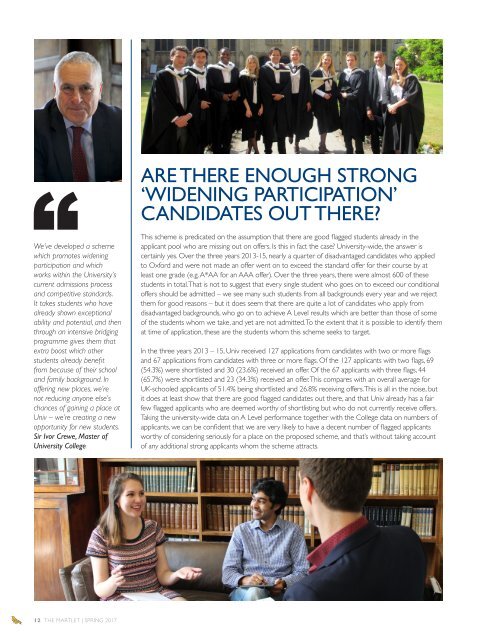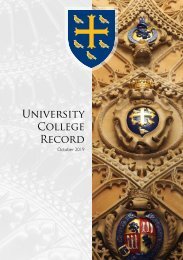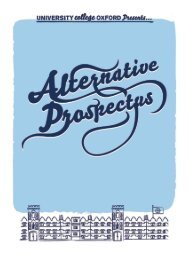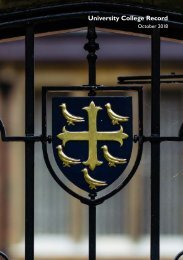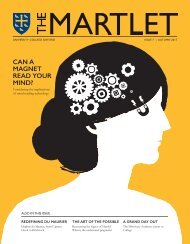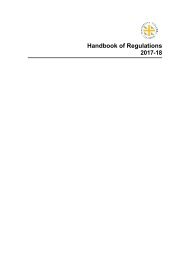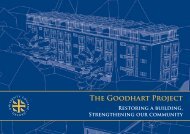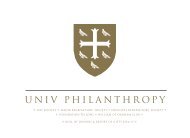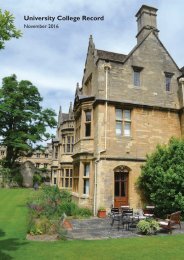Spring Martlet 2017
Spring Martlet 2017 V2
Spring Martlet 2017 V2
- No tags were found...
Create successful ePaper yourself
Turn your PDF publications into a flip-book with our unique Google optimized e-Paper software.
ARE THERE ENOUGH STRONG<br />
‘WIDENING PARTICIPATION’<br />
CANDIDATES OUT THERE?<br />
We’ve developed a scheme<br />
which promotes widening<br />
participation and which<br />
works within the University’s<br />
current admissions process<br />
and competitive standards.<br />
It takes students who have<br />
already shown exceptional<br />
ability and potential, and then<br />
through an intensive bridging<br />
programme gives them that<br />
extra boost which other<br />
students already benefit<br />
from because of their school<br />
and family background. In<br />
offering new places, we’re<br />
not reducing anyone else’s<br />
chances of gaining a place at<br />
Univ – we’re creating a new<br />
opportunity for new students.<br />
Sir Ivor Crewe, Master of<br />
University College<br />
This scheme is predicated on the assumption that there are good flagged students already in the<br />
applicant pool who are missing out on offers. Is this in fact the case? University-wide, the answer is<br />
certainly yes. Over the three years 2013-15, nearly a quarter of disadvantaged candidates who applied<br />
to Oxford and were not made an offer went on to exceed the standard offer for their course by at<br />
least one grade (e.g. A*AA for an AAA offer). Over the three years, there were almost 600 of these<br />
students in total. That is not to suggest that every single student who goes on to exceed our conditional<br />
offers should be admitted – we see many such students from all backgrounds every year and we reject<br />
them for good reasons – but it does seem that there are quite a lot of candidates who apply from<br />
disadvantaged backgrounds, who go on to achieve A Level results which are better than those of some<br />
of the students whom we take, and yet are not admitted. To the extent that it is possible to identify them<br />
at time of application, these are the students whom this scheme seeks to target.<br />
In the three years 2013 – 15, Univ received 127 applications from candidates with two or more flags<br />
and 67 applications from candidates with three or more flags. Of the 127 applicants with two flags, 69<br />
(54.3%) were shortlisted and 30 (23.6%) received an offer. Of the 67 applicants with three flags, 44<br />
(65.7%) were shortlisted and 23 (34.3%) received an offer. This compares with an overall average for<br />
UK-schooled applicants of 51.4% being shortlisted and 26.8% receiving offers. This is all in the noise, but<br />
it does at least show that there are good flagged candidates out there, and that Univ already has a fair<br />
few flagged applicants who are deemed worthy of shortlisting but who do not currently receive offers.<br />
Taking the university-wide data on A Level performance together with the College data on numbers of<br />
applicants, we can be confident that we are very likely to have a decent number of flagged applicants<br />
worthy of considering seriously for a place on the proposed scheme, and that’s without taking account<br />
of any additional strong applicants whom the scheme attracts.<br />
12 THE MARTLET | SPRING <strong>2017</strong>


